Research Report: Inflation's Impact on the UK Tourism Industry
VerifiedAdded on 2023/06/05
|9
|1896
|85
Report
AI Summary
This report examines the impact of inflation on the UK tourism industry, focusing on both positive and negative effects, particularly on Small and Medium Enterprises (SMEs). It identifies the causes of inflation, such as increased demand, decreased supply, and global events, and how these factors influence the tourism sector. The report highlights that while inflation can provide some benefits by increasing revenue from essential business travel, it primarily leads to negative outcomes like decreased customer base, unemployment, and reduced productivity for SMEs. The analysis includes quantitative data showing the inverse relationship between GDP growth and inflation in the UK. The report concludes with recommendations for mitigating the adverse effects of inflation, drawing on strategies employed by companies like Holiday Inn, such as offering discounts, managing employee wages, leveraging tax benefits, and cutting additional expenditures. The study suggests that these strategies can help tourism companies navigate inflationary periods effectively.
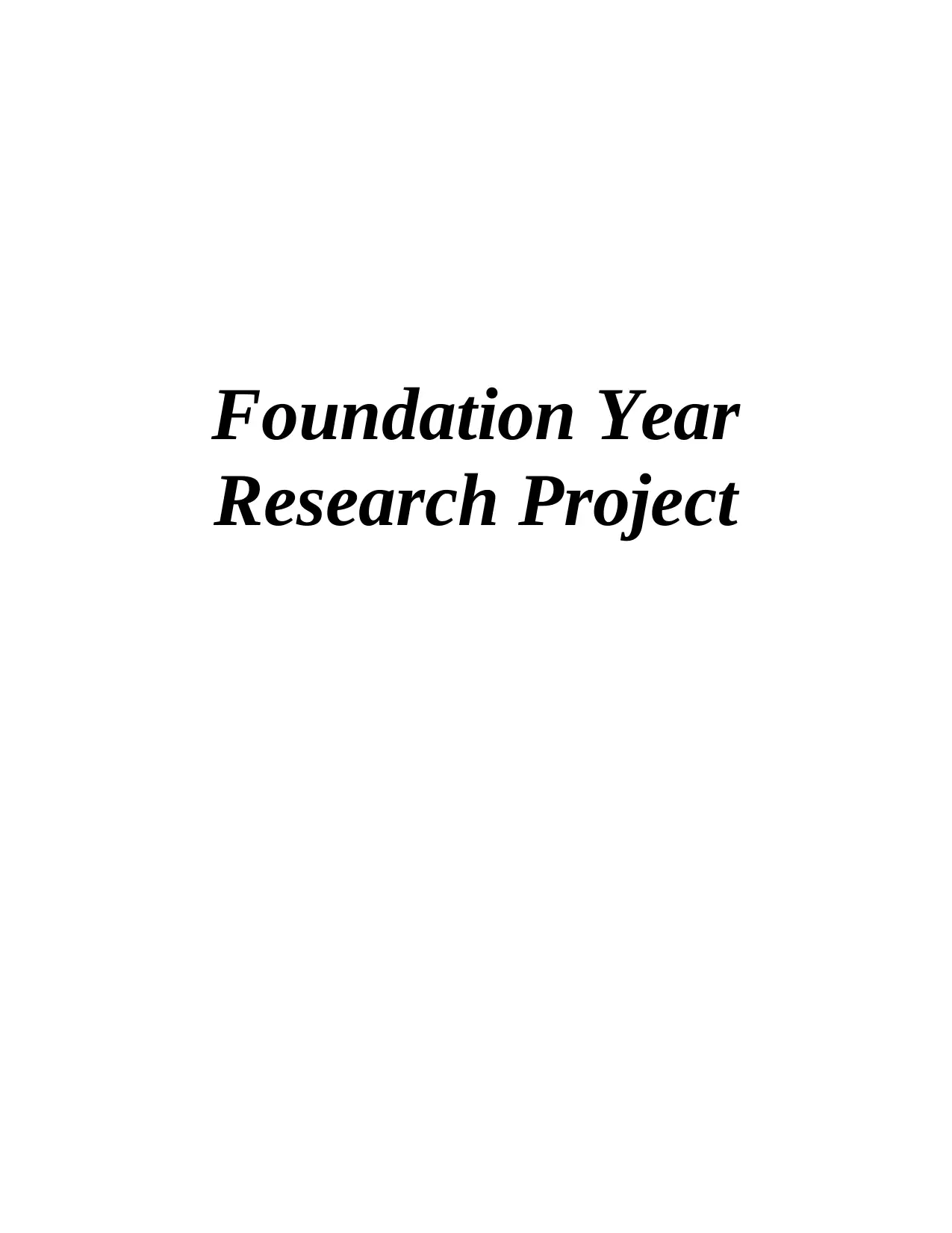
Foundation Year
Research Project
Research Project
Paraphrase This Document
Need a fresh take? Get an instant paraphrase of this document with our AI Paraphraser
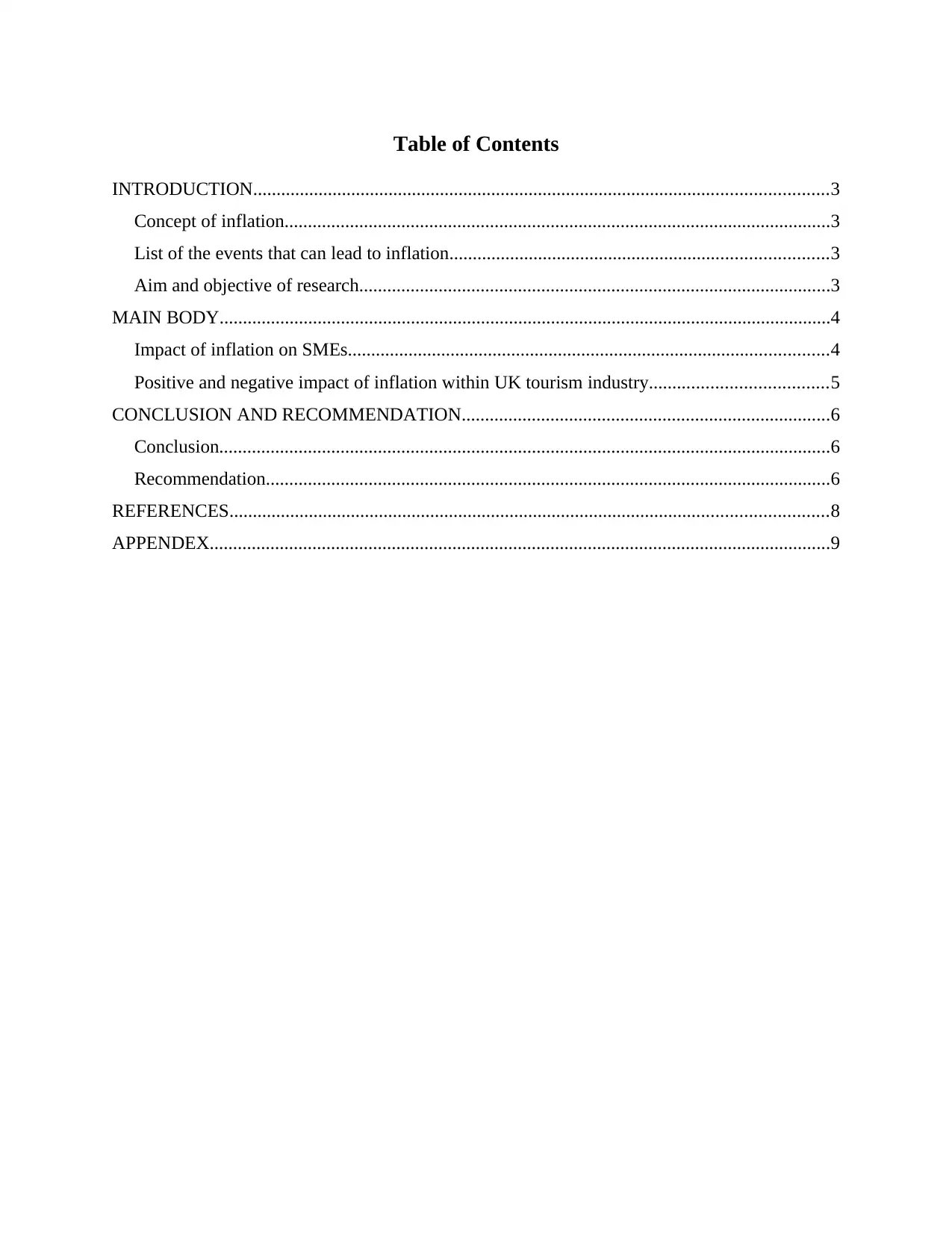
Table of Contents
INTRODUCTION...........................................................................................................................3
Concept of inflation.....................................................................................................................3
List of the events that can lead to inflation.................................................................................3
Aim and objective of research.....................................................................................................3
MAIN BODY...................................................................................................................................4
Impact of inflation on SMEs.......................................................................................................4
Positive and negative impact of inflation within UK tourism industry......................................5
CONCLUSION AND RECOMMENDATION...............................................................................6
Conclusion...................................................................................................................................6
Recommendation.........................................................................................................................6
REFERENCES................................................................................................................................8
APPENDEX.....................................................................................................................................9
INTRODUCTION...........................................................................................................................3
Concept of inflation.....................................................................................................................3
List of the events that can lead to inflation.................................................................................3
Aim and objective of research.....................................................................................................3
MAIN BODY...................................................................................................................................4
Impact of inflation on SMEs.......................................................................................................4
Positive and negative impact of inflation within UK tourism industry......................................5
CONCLUSION AND RECOMMENDATION...............................................................................6
Conclusion...................................................................................................................................6
Recommendation.........................................................................................................................6
REFERENCES................................................................................................................................8
APPENDEX.....................................................................................................................................9
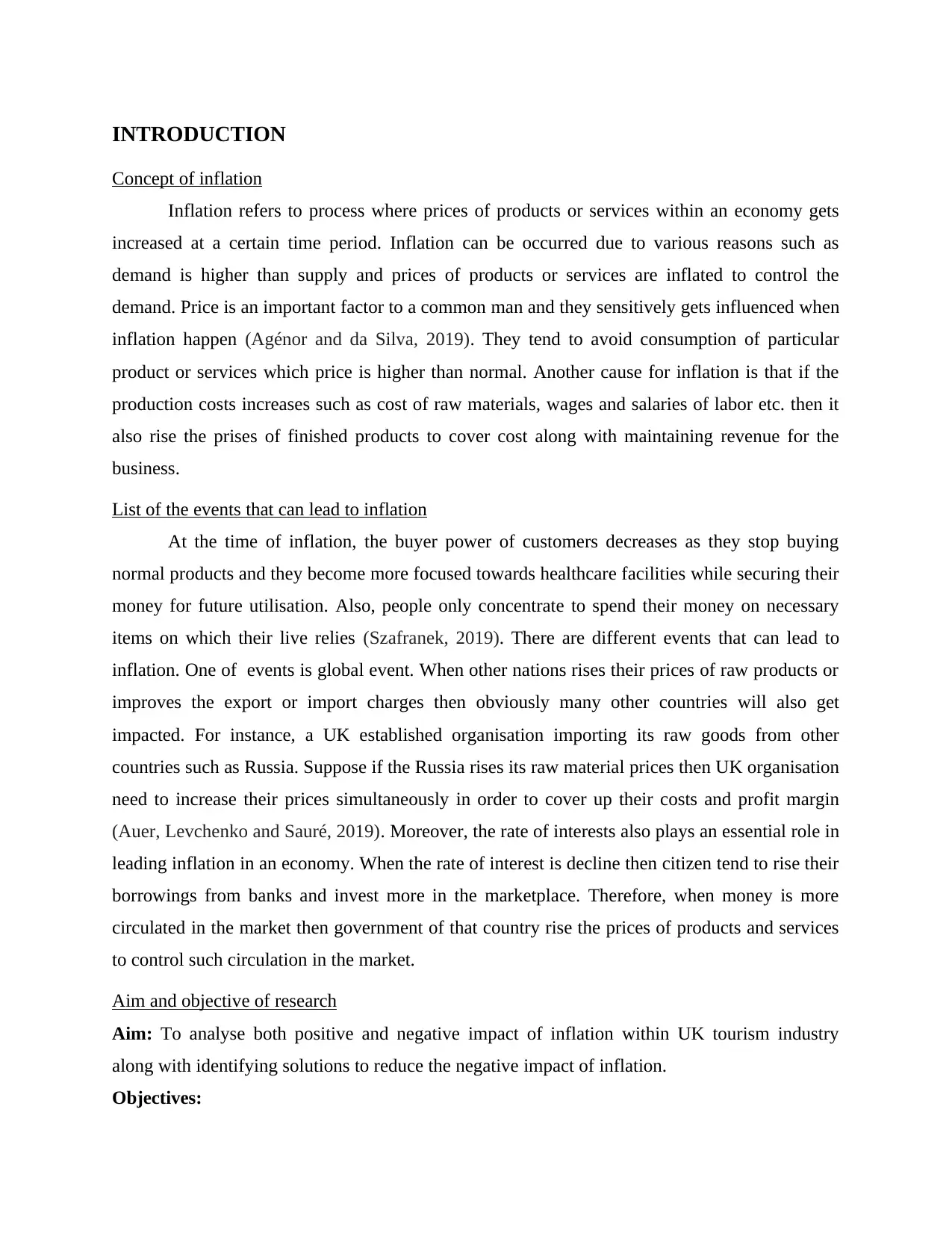
INTRODUCTION
Concept of inflation
Inflation refers to process where prices of products or services within an economy gets
increased at a certain time period. Inflation can be occurred due to various reasons such as
demand is higher than supply and prices of products or services are inflated to control the
demand. Price is an important factor to a common man and they sensitively gets influenced when
inflation happen (Agénor and da Silva, 2019). They tend to avoid consumption of particular
product or services which price is higher than normal. Another cause for inflation is that if the
production costs increases such as cost of raw materials, wages and salaries of labor etc. then it
also rise the prises of finished products to cover cost along with maintaining revenue for the
business.
List of the events that can lead to inflation
At the time of inflation, the buyer power of customers decreases as they stop buying
normal products and they become more focused towards healthcare facilities while securing their
money for future utilisation. Also, people only concentrate to spend their money on necessary
items on which their live relies (Szafranek, 2019). There are different events that can lead to
inflation. One of events is global event. When other nations rises their prices of raw products or
improves the export or import charges then obviously many other countries will also get
impacted. For instance, a UK established organisation importing its raw goods from other
countries such as Russia. Suppose if the Russia rises its raw material prices then UK organisation
need to increase their prices simultaneously in order to cover up their costs and profit margin
(Auer, Levchenko and Sauré, 2019). Moreover, the rate of interests also plays an essential role in
leading inflation in an economy. When the rate of interest is decline then citizen tend to rise their
borrowings from banks and invest more in the marketplace. Therefore, when money is more
circulated in the market then government of that country rise the prices of products and services
to control such circulation in the market.
Aim and objective of research
Aim: To analyse both positive and negative impact of inflation within UK tourism industry
along with identifying solutions to reduce the negative impact of inflation.
Objectives:
Concept of inflation
Inflation refers to process where prices of products or services within an economy gets
increased at a certain time period. Inflation can be occurred due to various reasons such as
demand is higher than supply and prices of products or services are inflated to control the
demand. Price is an important factor to a common man and they sensitively gets influenced when
inflation happen (Agénor and da Silva, 2019). They tend to avoid consumption of particular
product or services which price is higher than normal. Another cause for inflation is that if the
production costs increases such as cost of raw materials, wages and salaries of labor etc. then it
also rise the prises of finished products to cover cost along with maintaining revenue for the
business.
List of the events that can lead to inflation
At the time of inflation, the buyer power of customers decreases as they stop buying
normal products and they become more focused towards healthcare facilities while securing their
money for future utilisation. Also, people only concentrate to spend their money on necessary
items on which their live relies (Szafranek, 2019). There are different events that can lead to
inflation. One of events is global event. When other nations rises their prices of raw products or
improves the export or import charges then obviously many other countries will also get
impacted. For instance, a UK established organisation importing its raw goods from other
countries such as Russia. Suppose if the Russia rises its raw material prices then UK organisation
need to increase their prices simultaneously in order to cover up their costs and profit margin
(Auer, Levchenko and Sauré, 2019). Moreover, the rate of interests also plays an essential role in
leading inflation in an economy. When the rate of interest is decline then citizen tend to rise their
borrowings from banks and invest more in the marketplace. Therefore, when money is more
circulated in the market then government of that country rise the prices of products and services
to control such circulation in the market.
Aim and objective of research
Aim: To analyse both positive and negative impact of inflation within UK tourism industry
along with identifying solutions to reduce the negative impact of inflation.
Objectives:
⊘ This is a preview!⊘
Do you want full access?
Subscribe today to unlock all pages.

Trusted by 1+ million students worldwide
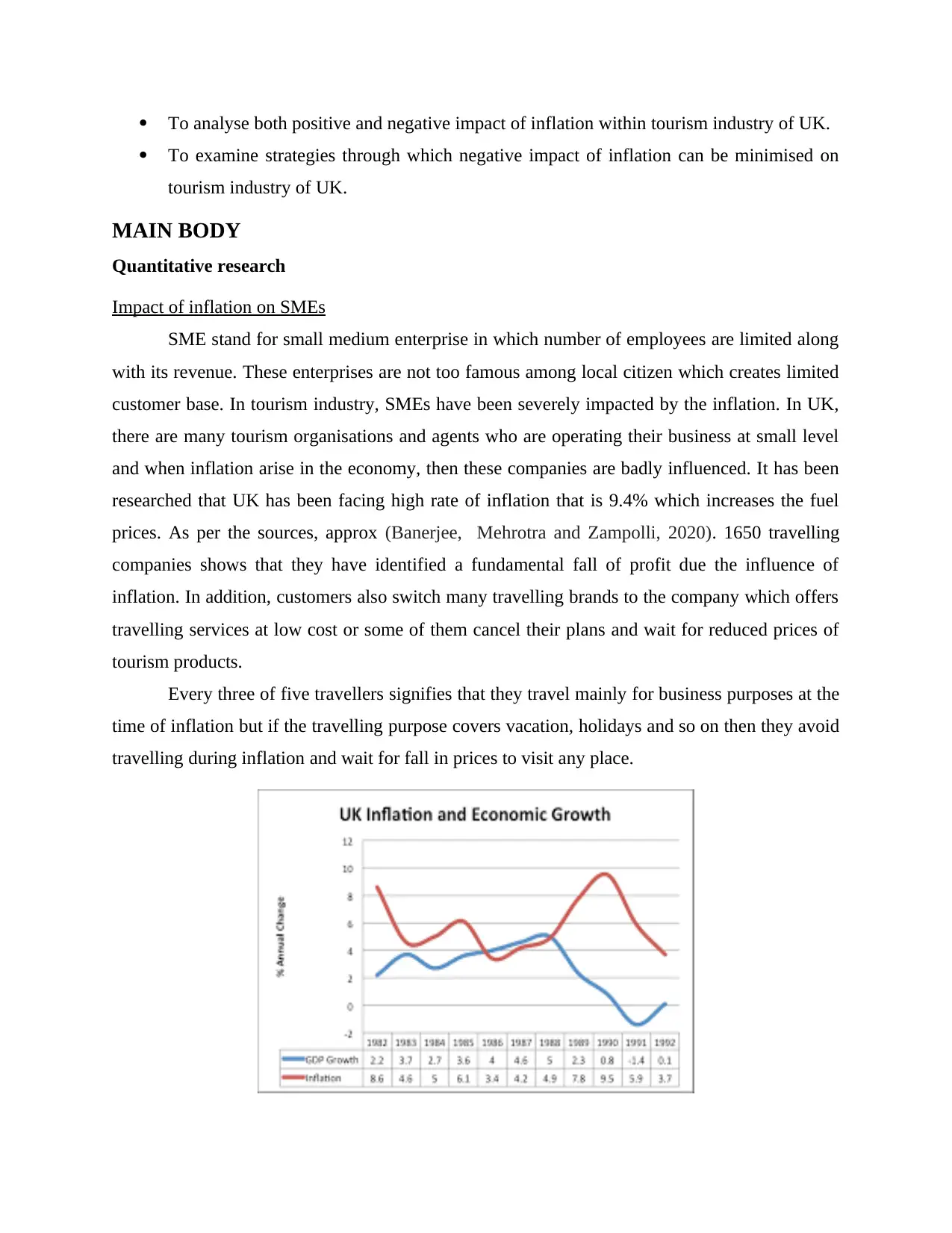
To analyse both positive and negative impact of inflation within tourism industry of UK.
To examine strategies through which negative impact of inflation can be minimised on
tourism industry of UK.
MAIN BODY
Quantitative research
Impact of inflation on SMEs
SME stand for small medium enterprise in which number of employees are limited along
with its revenue. These enterprises are not too famous among local citizen which creates limited
customer base. In tourism industry, SMEs have been severely impacted by the inflation. In UK,
there are many tourism organisations and agents who are operating their business at small level
and when inflation arise in the economy, then these companies are badly influenced. It has been
researched that UK has been facing high rate of inflation that is 9.4% which increases the fuel
prices. As per the sources, approx (Banerjee, Mehrotra and Zampolli, 2020). 1650 travelling
companies shows that they have identified a fundamental fall of profit due the influence of
inflation. In addition, customers also switch many travelling brands to the company which offers
travelling services at low cost or some of them cancel their plans and wait for reduced prices of
tourism products.
Every three of five travellers signifies that they travel mainly for business purposes at the
time of inflation but if the travelling purpose covers vacation, holidays and so on then they avoid
travelling during inflation and wait for fall in prices to visit any place.
To examine strategies through which negative impact of inflation can be minimised on
tourism industry of UK.
MAIN BODY
Quantitative research
Impact of inflation on SMEs
SME stand for small medium enterprise in which number of employees are limited along
with its revenue. These enterprises are not too famous among local citizen which creates limited
customer base. In tourism industry, SMEs have been severely impacted by the inflation. In UK,
there are many tourism organisations and agents who are operating their business at small level
and when inflation arise in the economy, then these companies are badly influenced. It has been
researched that UK has been facing high rate of inflation that is 9.4% which increases the fuel
prices. As per the sources, approx (Banerjee, Mehrotra and Zampolli, 2020). 1650 travelling
companies shows that they have identified a fundamental fall of profit due the influence of
inflation. In addition, customers also switch many travelling brands to the company which offers
travelling services at low cost or some of them cancel their plans and wait for reduced prices of
tourism products.
Every three of five travellers signifies that they travel mainly for business purposes at the
time of inflation but if the travelling purpose covers vacation, holidays and so on then they avoid
travelling during inflation and wait for fall in prices to visit any place.
Paraphrase This Document
Need a fresh take? Get an instant paraphrase of this document with our AI Paraphraser
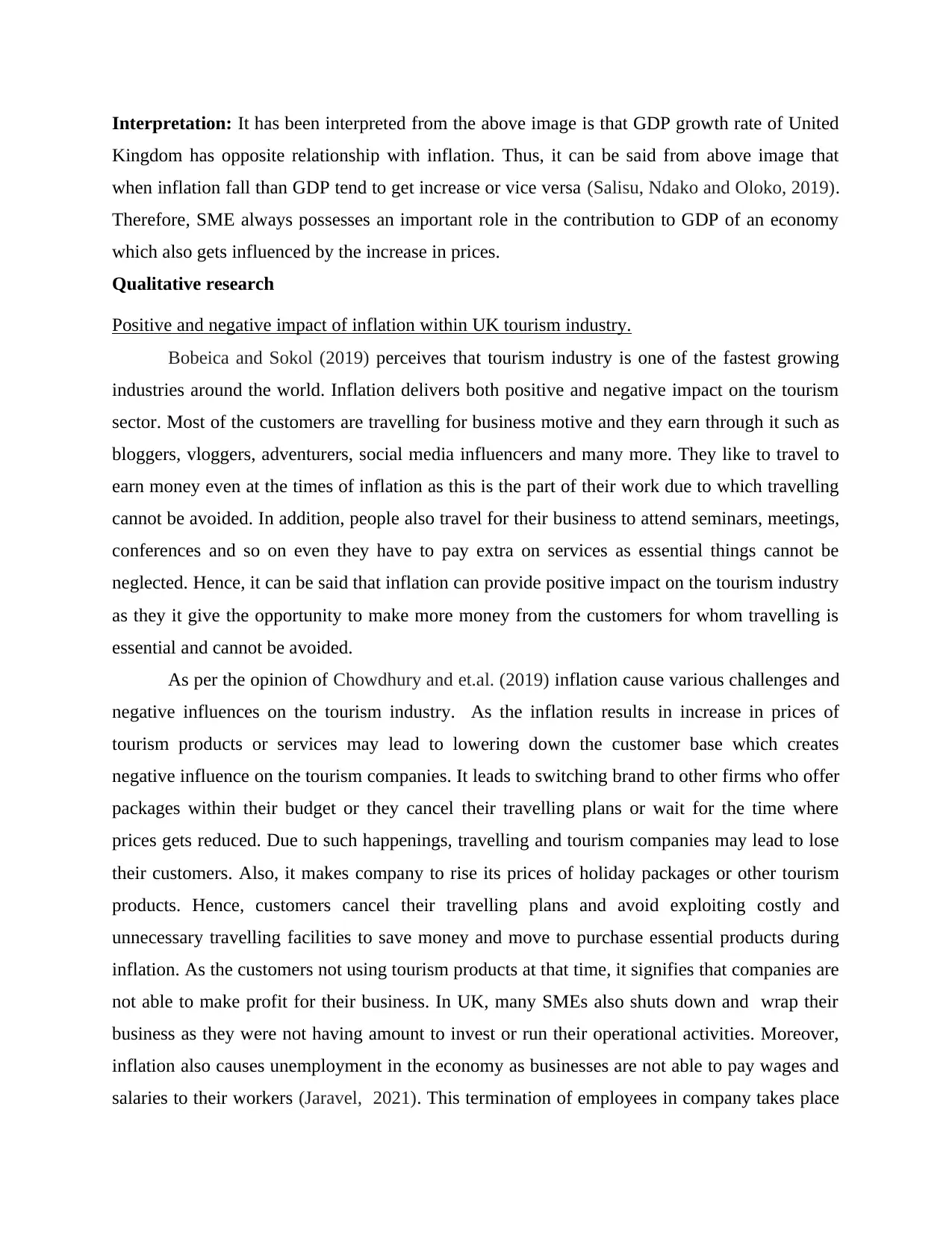
Interpretation: It has been interpreted from the above image is that GDP growth rate of United
Kingdom has opposite relationship with inflation. Thus, it can be said from above image that
when inflation fall than GDP tend to get increase or vice versa (Salisu, Ndako and Oloko, 2019).
Therefore, SME always possesses an important role in the contribution to GDP of an economy
which also gets influenced by the increase in prices.
Qualitative research
Positive and negative impact of inflation within UK tourism industry.
Bobeica and Sokol (2019) perceives that tourism industry is one of the fastest growing
industries around the world. Inflation delivers both positive and negative impact on the tourism
sector. Most of the customers are travelling for business motive and they earn through it such as
bloggers, vloggers, adventurers, social media influencers and many more. They like to travel to
earn money even at the times of inflation as this is the part of their work due to which travelling
cannot be avoided. In addition, people also travel for their business to attend seminars, meetings,
conferences and so on even they have to pay extra on services as essential things cannot be
neglected. Hence, it can be said that inflation can provide positive impact on the tourism industry
as they it give the opportunity to make more money from the customers for whom travelling is
essential and cannot be avoided.
As per the opinion of Chowdhury and et.al. (2019) inflation cause various challenges and
negative influences on the tourism industry. As the inflation results in increase in prices of
tourism products or services may lead to lowering down the customer base which creates
negative influence on the tourism companies. It leads to switching brand to other firms who offer
packages within their budget or they cancel their travelling plans or wait for the time where
prices gets reduced. Due to such happenings, travelling and tourism companies may lead to lose
their customers. Also, it makes company to rise its prices of holiday packages or other tourism
products. Hence, customers cancel their travelling plans and avoid exploiting costly and
unnecessary travelling facilities to save money and move to purchase essential products during
inflation. As the customers not using tourism products at that time, it signifies that companies are
not able to make profit for their business. In UK, many SMEs also shuts down and wrap their
business as they were not having amount to invest or run their operational activities. Moreover,
inflation also causes unemployment in the economy as businesses are not able to pay wages and
salaries to their workers (Jaravel, 2021). This termination of employees in company takes place
Kingdom has opposite relationship with inflation. Thus, it can be said from above image that
when inflation fall than GDP tend to get increase or vice versa (Salisu, Ndako and Oloko, 2019).
Therefore, SME always possesses an important role in the contribution to GDP of an economy
which also gets influenced by the increase in prices.
Qualitative research
Positive and negative impact of inflation within UK tourism industry.
Bobeica and Sokol (2019) perceives that tourism industry is one of the fastest growing
industries around the world. Inflation delivers both positive and negative impact on the tourism
sector. Most of the customers are travelling for business motive and they earn through it such as
bloggers, vloggers, adventurers, social media influencers and many more. They like to travel to
earn money even at the times of inflation as this is the part of their work due to which travelling
cannot be avoided. In addition, people also travel for their business to attend seminars, meetings,
conferences and so on even they have to pay extra on services as essential things cannot be
neglected. Hence, it can be said that inflation can provide positive impact on the tourism industry
as they it give the opportunity to make more money from the customers for whom travelling is
essential and cannot be avoided.
As per the opinion of Chowdhury and et.al. (2019) inflation cause various challenges and
negative influences on the tourism industry. As the inflation results in increase in prices of
tourism products or services may lead to lowering down the customer base which creates
negative influence on the tourism companies. It leads to switching brand to other firms who offer
packages within their budget or they cancel their travelling plans or wait for the time where
prices gets reduced. Due to such happenings, travelling and tourism companies may lead to lose
their customers. Also, it makes company to rise its prices of holiday packages or other tourism
products. Hence, customers cancel their travelling plans and avoid exploiting costly and
unnecessary travelling facilities to save money and move to purchase essential products during
inflation. As the customers not using tourism products at that time, it signifies that companies are
not able to make profit for their business. In UK, many SMEs also shuts down and wrap their
business as they were not having amount to invest or run their operational activities. Moreover,
inflation also causes unemployment in the economy as businesses are not able to pay wages and
salaries to their workers (Jaravel, 2021). This termination of employees in company takes place
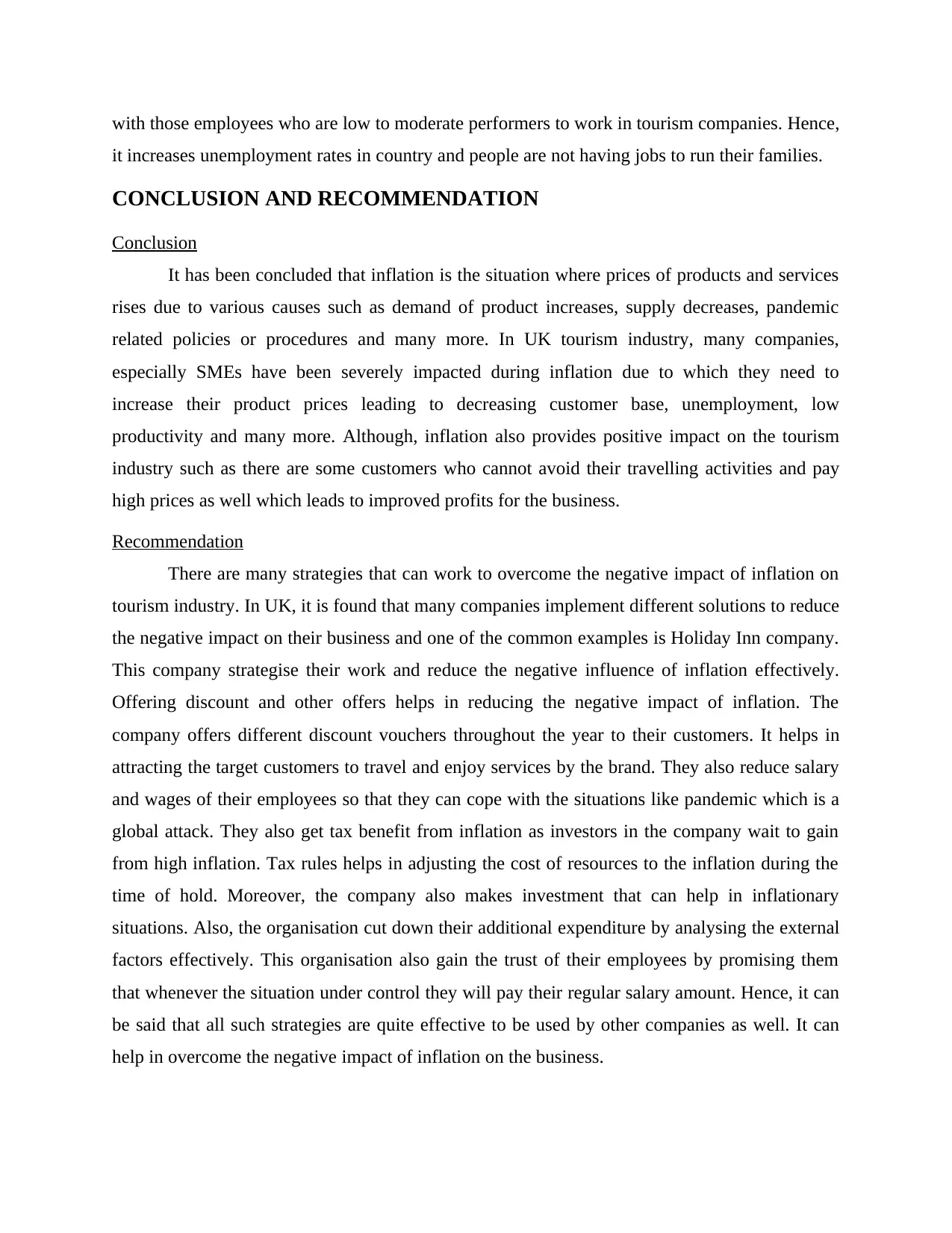
with those employees who are low to moderate performers to work in tourism companies. Hence,
it increases unemployment rates in country and people are not having jobs to run their families.
CONCLUSION AND RECOMMENDATION
Conclusion
It has been concluded that inflation is the situation where prices of products and services
rises due to various causes such as demand of product increases, supply decreases, pandemic
related policies or procedures and many more. In UK tourism industry, many companies,
especially SMEs have been severely impacted during inflation due to which they need to
increase their product prices leading to decreasing customer base, unemployment, low
productivity and many more. Although, inflation also provides positive impact on the tourism
industry such as there are some customers who cannot avoid their travelling activities and pay
high prices as well which leads to improved profits for the business.
Recommendation
There are many strategies that can work to overcome the negative impact of inflation on
tourism industry. In UK, it is found that many companies implement different solutions to reduce
the negative impact on their business and one of the common examples is Holiday Inn company.
This company strategise their work and reduce the negative influence of inflation effectively.
Offering discount and other offers helps in reducing the negative impact of inflation. The
company offers different discount vouchers throughout the year to their customers. It helps in
attracting the target customers to travel and enjoy services by the brand. They also reduce salary
and wages of their employees so that they can cope with the situations like pandemic which is a
global attack. They also get tax benefit from inflation as investors in the company wait to gain
from high inflation. Tax rules helps in adjusting the cost of resources to the inflation during the
time of hold. Moreover, the company also makes investment that can help in inflationary
situations. Also, the organisation cut down their additional expenditure by analysing the external
factors effectively. This organisation also gain the trust of their employees by promising them
that whenever the situation under control they will pay their regular salary amount. Hence, it can
be said that all such strategies are quite effective to be used by other companies as well. It can
help in overcome the negative impact of inflation on the business.
it increases unemployment rates in country and people are not having jobs to run their families.
CONCLUSION AND RECOMMENDATION
Conclusion
It has been concluded that inflation is the situation where prices of products and services
rises due to various causes such as demand of product increases, supply decreases, pandemic
related policies or procedures and many more. In UK tourism industry, many companies,
especially SMEs have been severely impacted during inflation due to which they need to
increase their product prices leading to decreasing customer base, unemployment, low
productivity and many more. Although, inflation also provides positive impact on the tourism
industry such as there are some customers who cannot avoid their travelling activities and pay
high prices as well which leads to improved profits for the business.
Recommendation
There are many strategies that can work to overcome the negative impact of inflation on
tourism industry. In UK, it is found that many companies implement different solutions to reduce
the negative impact on their business and one of the common examples is Holiday Inn company.
This company strategise their work and reduce the negative influence of inflation effectively.
Offering discount and other offers helps in reducing the negative impact of inflation. The
company offers different discount vouchers throughout the year to their customers. It helps in
attracting the target customers to travel and enjoy services by the brand. They also reduce salary
and wages of their employees so that they can cope with the situations like pandemic which is a
global attack. They also get tax benefit from inflation as investors in the company wait to gain
from high inflation. Tax rules helps in adjusting the cost of resources to the inflation during the
time of hold. Moreover, the company also makes investment that can help in inflationary
situations. Also, the organisation cut down their additional expenditure by analysing the external
factors effectively. This organisation also gain the trust of their employees by promising them
that whenever the situation under control they will pay their regular salary amount. Hence, it can
be said that all such strategies are quite effective to be used by other companies as well. It can
help in overcome the negative impact of inflation on the business.
⊘ This is a preview!⊘
Do you want full access?
Subscribe today to unlock all pages.

Trusted by 1+ million students worldwide
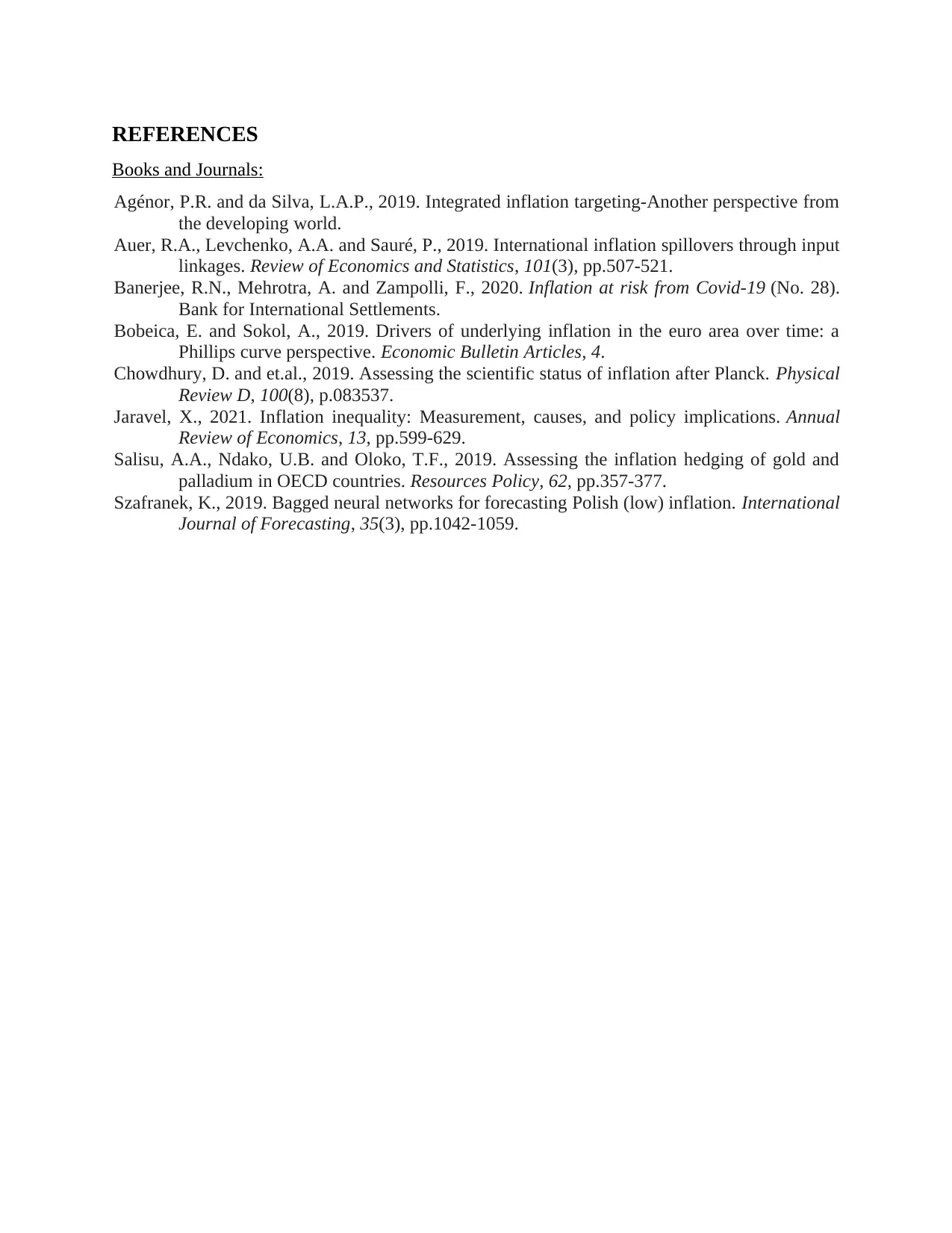
REFERENCES
Books and Journals:
Agénor, P.R. and da Silva, L.A.P., 2019. Integrated inflation targeting-Another perspective from
the developing world.
Auer, R.A., Levchenko, A.A. and Sauré, P., 2019. International inflation spillovers through input
linkages. Review of Economics and Statistics, 101(3), pp.507-521.
Banerjee, R.N., Mehrotra, A. and Zampolli, F., 2020. Inflation at risk from Covid-19 (No. 28).
Bank for International Settlements.
Bobeica, E. and Sokol, A., 2019. Drivers of underlying inflation in the euro area over time: a
Phillips curve perspective. Economic Bulletin Articles, 4.
Chowdhury, D. and et.al., 2019. Assessing the scientific status of inflation after Planck. Physical
Review D, 100(8), p.083537.
Jaravel, X., 2021. Inflation inequality: Measurement, causes, and policy implications. Annual
Review of Economics, 13, pp.599-629.
Salisu, A.A., Ndako, U.B. and Oloko, T.F., 2019. Assessing the inflation hedging of gold and
palladium in OECD countries. Resources Policy, 62, pp.357-377.
Szafranek, K., 2019. Bagged neural networks for forecasting Polish (low) inflation. International
Journal of Forecasting, 35(3), pp.1042-1059.
Books and Journals:
Agénor, P.R. and da Silva, L.A.P., 2019. Integrated inflation targeting-Another perspective from
the developing world.
Auer, R.A., Levchenko, A.A. and Sauré, P., 2019. International inflation spillovers through input
linkages. Review of Economics and Statistics, 101(3), pp.507-521.
Banerjee, R.N., Mehrotra, A. and Zampolli, F., 2020. Inflation at risk from Covid-19 (No. 28).
Bank for International Settlements.
Bobeica, E. and Sokol, A., 2019. Drivers of underlying inflation in the euro area over time: a
Phillips curve perspective. Economic Bulletin Articles, 4.
Chowdhury, D. and et.al., 2019. Assessing the scientific status of inflation after Planck. Physical
Review D, 100(8), p.083537.
Jaravel, X., 2021. Inflation inequality: Measurement, causes, and policy implications. Annual
Review of Economics, 13, pp.599-629.
Salisu, A.A., Ndako, U.B. and Oloko, T.F., 2019. Assessing the inflation hedging of gold and
palladium in OECD countries. Resources Policy, 62, pp.357-377.
Szafranek, K., 2019. Bagged neural networks for forecasting Polish (low) inflation. International
Journal of Forecasting, 35(3), pp.1042-1059.
Paraphrase This Document
Need a fresh take? Get an instant paraphrase of this document with our AI Paraphraser
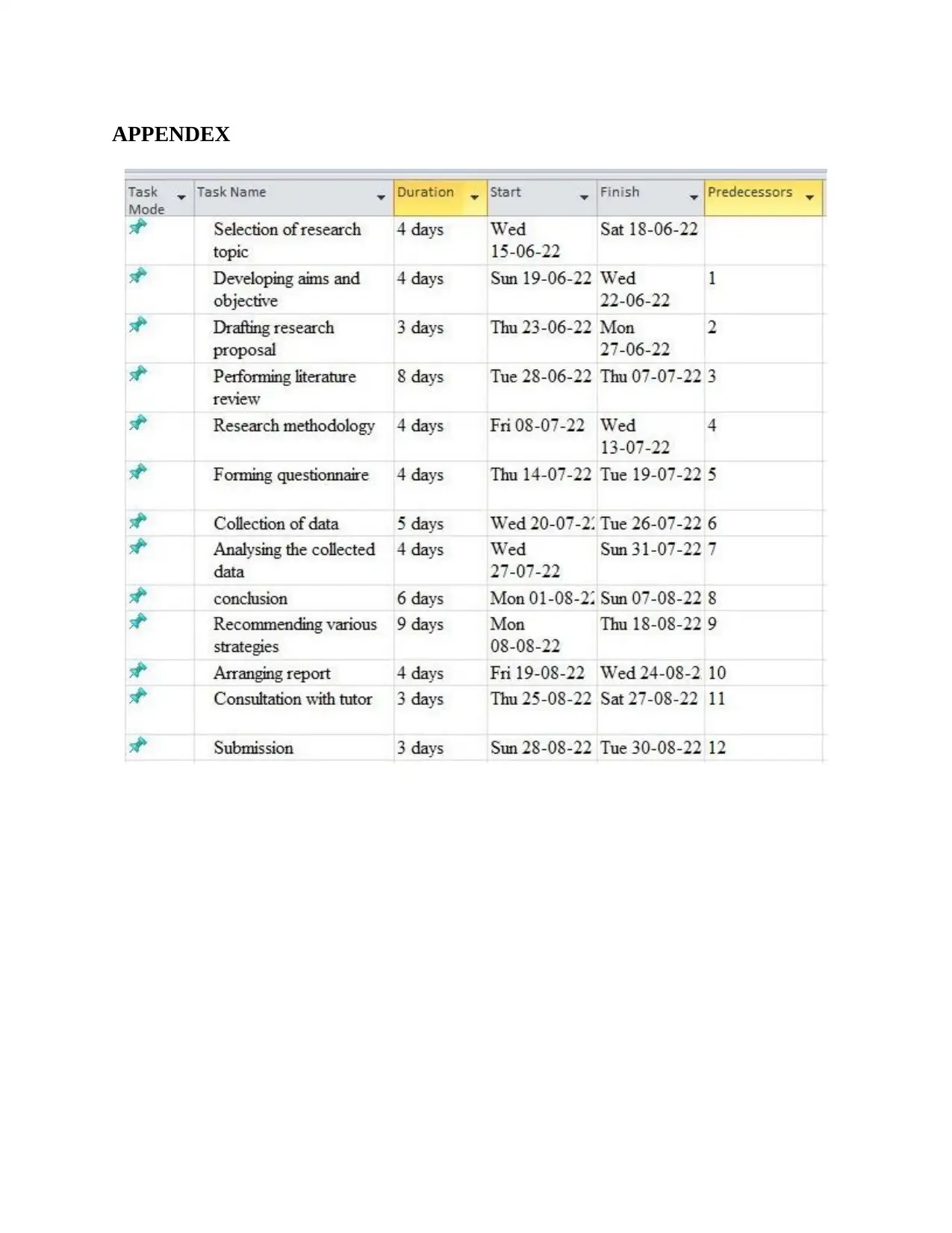
APPENDEX
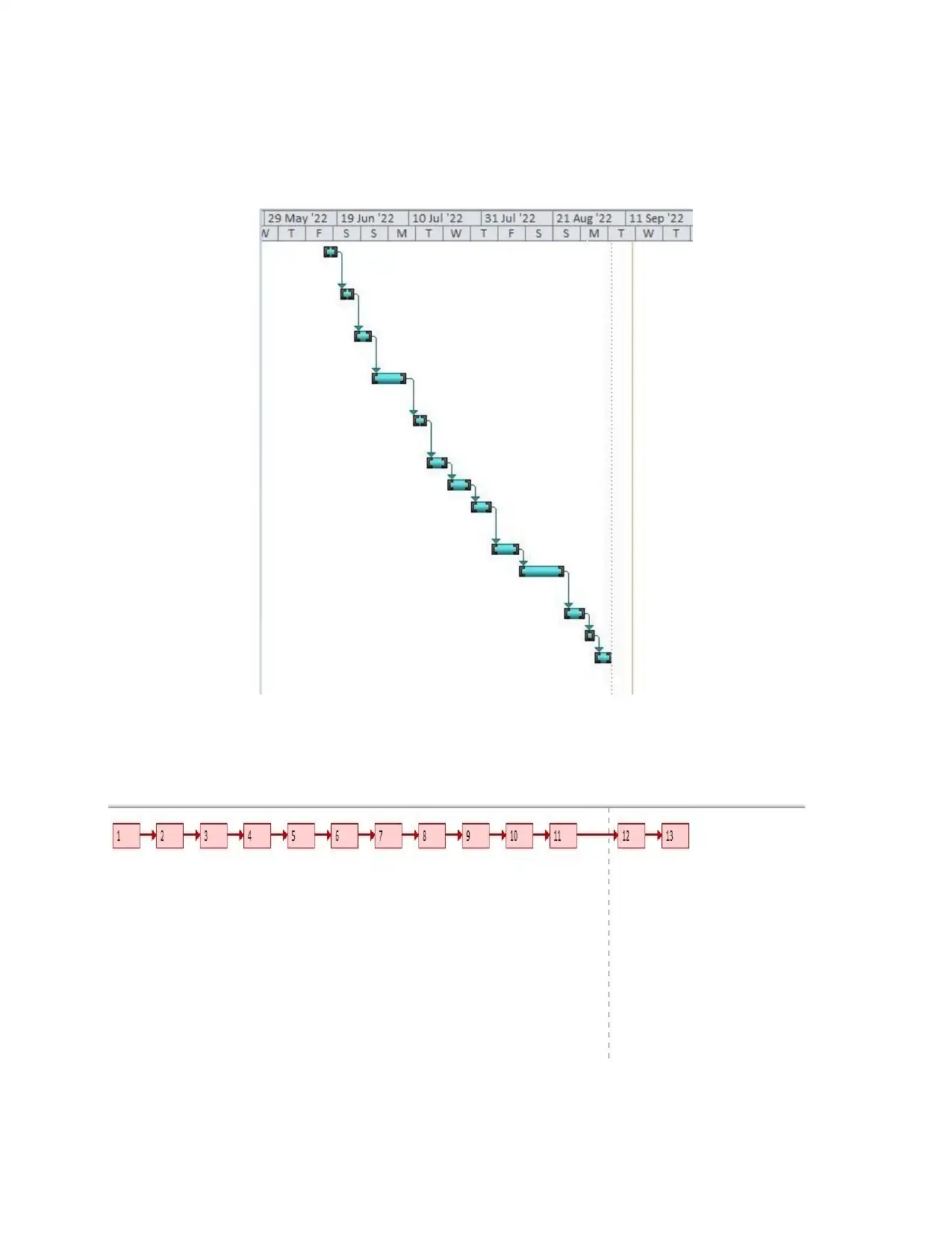
⊘ This is a preview!⊘
Do you want full access?
Subscribe today to unlock all pages.

Trusted by 1+ million students worldwide
1 out of 9
Related Documents
Your All-in-One AI-Powered Toolkit for Academic Success.
+13062052269
info@desklib.com
Available 24*7 on WhatsApp / Email
![[object Object]](/_next/static/media/star-bottom.7253800d.svg)
Unlock your academic potential
Copyright © 2020–2026 A2Z Services. All Rights Reserved. Developed and managed by ZUCOL.



